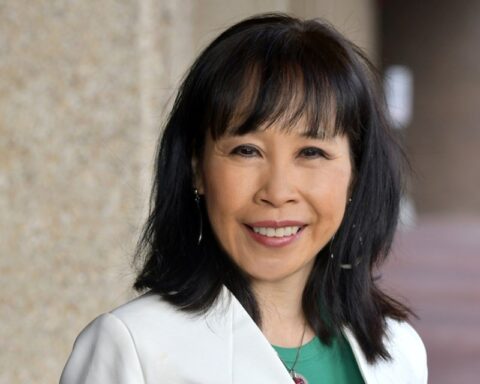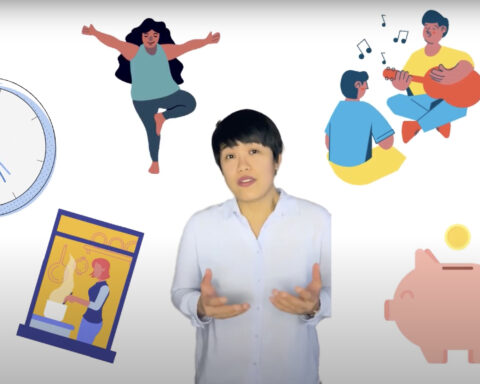In today’s economy, Filipina-Canadian healthcare worker Bing Orense struggles to save for her children’s education.
Still, she puts in $150 every month for two of her kids — Jenny, 15, and NJ, 12 — knowing it will be a worthy investment in the future.
She says it doesn’t even matter if she has to borrow money for it; she’s learned a hard lesson from her experience with her eldest daughter, 25-year-old Joanna.
Difficult beginnings
Orense arrived in Canada under the Domestic Worker Program in 1990, four years before her family joined her in the country.
Like it is for many new immigrants, starting a new life together was difficult at first as both Orense and her husband worked odd jobs to help make ends meet.
She heard about the Registered Education Savings Plan (RESP), a tax-sheltered investment option for parents and guardians to save for their children’s post secondary education, through an insurance agent. However, with many expenses to meet, there was simply no extra money to contribute to an RESP.
“It starts with affordability,” says Orense. “It’s paycheque versus expenses — what are my priorities? With food, housing, clothing, transportation and some leisure expenses, our paycheque wasn’t even enough to cover the basics.”
The family’s circumstances improved by 2001 when Orense and her husband both found regular jobs with extended health and dental benefits. They started setting aside $100 per month, but it was too late.
“It’s paycheque versus expenses — what are my priorities?”
The savings weren’t enough to cover their daughter Joanne’s tuition when she began attending the University of British Columbia (UBC) in 2008.
Orense explains that they were able to get about $8,000 from Joanne’s RESP, which was only enough to cover her first year at UBC.
She and her husband had to take out annual loans of approximately $10,000 to cover Joanna’s second to fourth years of studying. The burden became so heavy that by her final year in university, Joanna offered to take out a student loan.
Orense says that the reason she and her husband were willing to incur debt to pay for most of Joanna’s education was because they wanted to be supportive.
“I think we Filipinos are used to paying for our children’s education,” Orense explains. “At that time, it was what both my husband and I wanted… we encouraged her to keep going to school, learn and get a degree.”
The reality of having to pay for her own school came with a lot of sacrifices for Joanna. She lived and stayed at home while attending university to save on dorm and rental costs. The young student also worked odd jobs to pay for her allowance and other spending.
Importance of saving early
Although Orense believes this experience taught Joanna how to budget and save money, she is taking a different approach with her younger children, having started their education savings early.
Although she has a bigger family with more expenses now, she tries to save for her children’s education even if it means starting small.
“I regret not making the most of the 20 per cent government grant so I really try and force myself to save,” Orense says. “Every extra I have goes there, it’s an investment.” Financial adviser Lorina Serafico agrees.
Serafico is also co-founder of the Vancouver Committee for Domestic Workers and Caregivers Rights (CDWCR). The organization holds weekly sessions to empower caregivers with knowledge on issues like labour rights, immigration policies and financial literacy.
“I regret not making the most of the 20 per cent government grant.”
Serafico admits that education savings are hardly a priority for many caregivers in their first few years in Canada. Much of this has to do with their temporary status in the beginning.
“It’s hard for nannies because their children are not here yet and so saving for their education is still far from their minds,” she explains. “Their priority is to get landed status first for their husband and children to come here.”
She adds that once they bring their families to Canada, these caregivers also have a limited pool of money that can go to savings since many of them still carry debt to cover the costs of migrating to a new country.
Take advantage of the free stuff
Despite these challenges, Serafico says there are ways to start saving for education early as long as it is made a priority.
Newcomers can make use of money from government assistance programs like the Child Tax Benefit and the Universal Child Care Benefit to start their children’s RESP.
Serafico says many caregivers can learn more about the RESP when they receive notice from government of their eligibility for the Canada Learning Bond, a grant offered to children of low-income families to help start their education savings.
She also encourages Filipinos to break the habit of sending their children to private elementary and high schools when they can take advantage of the public school system and use the money to save for post-secondary education instead.
“You can start small, and take advantage of the free stuff and any money you can put to college, put it there,” urges Serafico.
Journalist Priya Ramanujam mentored the writer of this article, through the New Canadian Media mentorship program.
This is the first n a five-part education series on New Canadian Media looking at the experiences of different families with saving for education in Canada. November is financial literacy month across Canada and November 15-21 is Education Savings Week.
Visit SmartSAVER.org to learn more about Registered Education Savings Plans (RESP) and to start an RESP with your choice of six major banks and credit unions. RESP information is available in 16 languages. Apply online between Nov. 1 and Dec. 31, 2015 and you will automatically be entered to win one of nine $1,000 weekly prizes! Learn more here.




